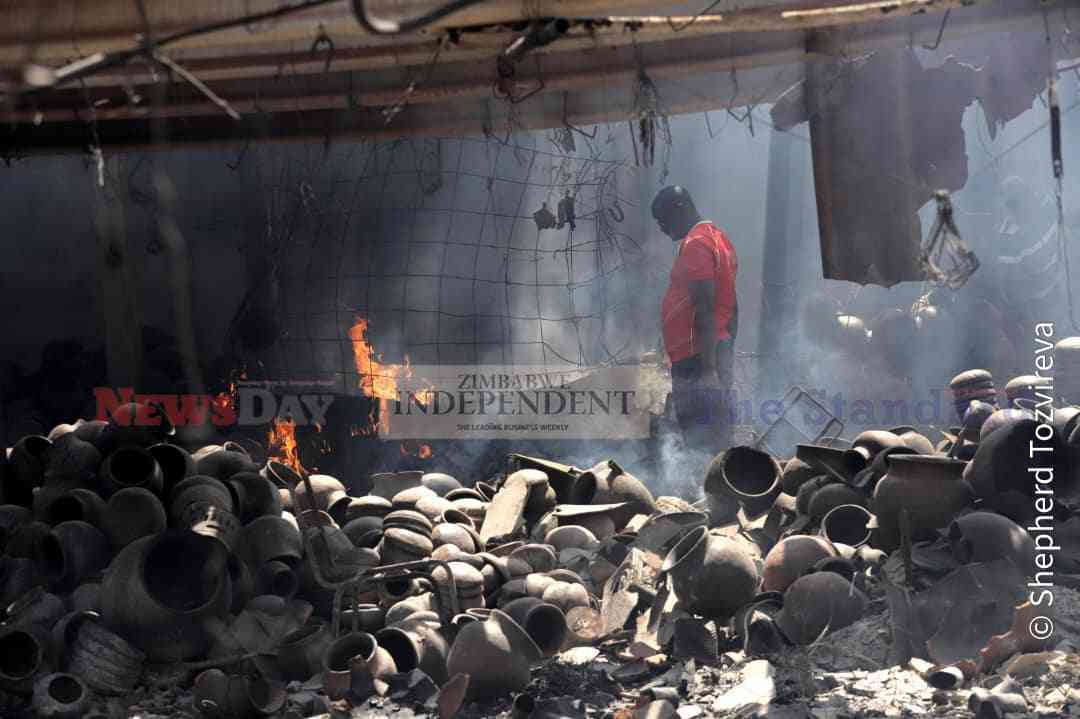
ON the night of October 10, 2024, a devastating fire swept through Mbare Musika, Zimbabwe’s largest informal marketplace leaving countless vendors grappling with severe losses of goods and property. This tragic event is a painful reminder of the precarious conditions faced by Zimbabwe’s informal sector workers.
The informal sector is a cornerstone of Zimbabwe’s economy, accounting for 80–90% of employment and contributing approximately 64% to GDP.
It provides critical income and livelihood for millions of Zimbabweans, especially in an economic environment where the formal job market struggles to absorb new entrants.
However, despite its significant contributions, the sector remains vulnerable to systemic risks, including lack of safety nets, insufficient infrastructure, and inadequate government support.
Mbare Musika is more than just a market; it serves as the lifeblood of Zimbabwe’s informal economy, acting as a central hub for thousands of traders who supply fresh produce and essential goods to communities across the country.
Farmers from all corners of Zimbabwe flock to Mbare Musika daily to sell their produce, while residents purchase everything from food to clothing.
Any disruption at this hub has far-reaching consequences for the entire informal economy ecosystem, affecting both traders and consumers alike.
Many informal workers in Mbare, already struggling under an unforgiving economic environment, now face an even bleaker future. In the absence of insurance, social protections, or emergency aid, the road to recovery for these informal traders will be long and arduous.
- Touts terrorise commuters
- Chiwenga repeats Mbare refurb pledge
- Broken families: A havens for molesters
- Mbare's heart stands still: fire ravages local marketplace, leaving vendors in despair
Keep Reading
The Mbare Musika fire highlights the broader precarious conditions faced by Zimbabwe’s informal workers. Operating in unregulated environments, they are often excluded from basic protections afforded to workers in the formal economy. Informal workers are not covered by social security, pensions, or unemployment benefits.
In the event of a disaster like the Mbare fire, they are left with no safety nets to fall back on.
Many informal markets in Zimbabwe lack essential infrastructure such as fire safety systems, clean water, sanitation, and electricity. Inadequate infrastructure makes these markets prone to accidents and disasters, which are difficult to mitigate in the absence of modern facilities.
Many informal sector traders have no access to insurance for their goods or premises. When disasters strike, such as fires, floods, or theft, they bear the full brunt of the loss. This lack of financial security places additional stress on an already vulnerable population.
Women, who make up the majority of informal traders, face additional challenges, including gender-based discrimination and limited access to resources like credit.
They are often disproportionately affected during crises, as they typically earn less and have fewer assets to rebuild their businesses.
The informal sector's precariousness is exacerbated by a lack of training and support systems tailored to women’s specific needs, making it vital for policies to address these disparities directly.
Informal sector workers often operate in hazardous environments. Many markets lack proper sanitation, leaving vendors and customers vulnerable to diseases.
Additionally, frequent power cuts lead to the unsafe use of candles or makeshift lighting, which increases the risk of fires.
The absence of health and safety regulations further complicates the situation, as informal workers navigate daily risks without the necessary safeguards.
As the Mbare Musika fire demonstrates, a single disaster can devastate livelihoods that are already precarious.
The Mbare Musika fire is a clear indication that Zimbabwe can no longer afford to ignore the challenges faced by the informal sector. The mindset that "informal is normal" — while recognising the permanence of the sector — should not lead to complacency.
Informal workers are essential to Zimbabwe's economy and their well-being should be a national priority.
Instead of pushing for formalisation, which is neither feasible nor practical in the short term, the focus should shift to improving the conditions within the informal sector.
Local authorities, in partnership with the central government, should prioritise upgrading markets like Mbare Musika with modern, fire-resistant structures, designated storage facilities, and proper sanitation.
Installing boreholes for water access and ensuring reliable electricity supply would significantly reduce risks.
A lack of financial services is a significant obstacle for informal traders. Government and financial institutions should create tailored financial products for informal workers, such as micro-insurance and affordable loans to help them rebuild after disasters and invest in safer more resilient business practices.
Social safety nets, such as health insurance, pension schemes, and unemployment benefits, must be extended to informal workers.
Strengthening institutions like the National Social Security Authority (Nssa) to include the informal sector will provide a layer of security for workers who currently have none.
To successfully implement pensions for the informal sector, policymakers need to select suitable, well-regulated investment instruments, such as government debt, rather than high-risk options like venture capital.
Three key considerations are essential: aligning investments with the scheme's goals, ensuring long-term positive returns while minimising costs and maintaining strong governance.
Effective pension schemes for informal workers, like Ghana's Tier III, have shown that it is possible to achieve these goals with the right balance of return, communication and participant engagement contributing to broader social protection strategies.
Informal traders should receive basic disaster management training, and markets should have fire prevention and response systems in place.
Regular drills and awareness campaigns could help mitigate future disasters, empowering workers to respond effectively in emergencies.
Since women form the majority of informal workers, policies must ensure that their specific needs are met, including equal access to resources, financial services, and training.
Special attention should be paid to gender-responsive social protection and income support for women in informal work.
This approach not only uplifts women but also strengthens the overall resilience of the informal economy.
The Mbare Musika fire has shed light on the precarious nature of Zimbabwe's informal sector, but it also offers an opportunity for change.
Investing in infrastructure, extending social protections, and developing inclusive financial policies can protect the livelihoods of millions of Zimbabweans and enhance the resilience of the informal economy.
For too long, informal workers have been left to fend for themselves in an unforgiving environment. It is time for the government, local authorities, and the private sector to collaborate in transforming Zimbabwe’s informal sector into one that is safer, more secure, and better equipped to withstand the challenges of the modern world. The future of Zimbabwe’s economy — and the well-being of millions —depend on it.
- Zuze is an independent economic analyst. His areas of interests include the informal sector, firm productivity, inequality and poverty. — michaelzuzee@gmail.com. These weekly New Perspectives articles, published in the Zimbabwe Independent, are coordinated by Lovemore Kadenge, an independent consultant, managing consultant of Zawale Consultants (Pvt) Ltd, past president of the Zimbabwe Economics Society and past president of the Chartered Governance & Accountancy Institute in Zimbabwe (CGI Zimbabwe). — kadenge.zes@gmail.com or mobile: +263 772 382 852.










